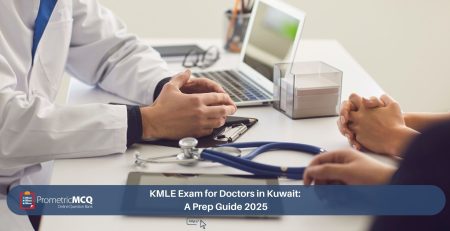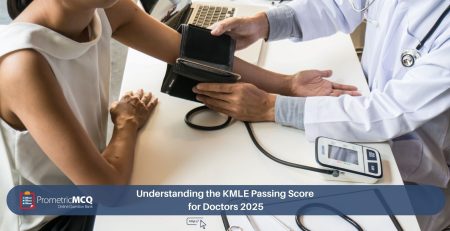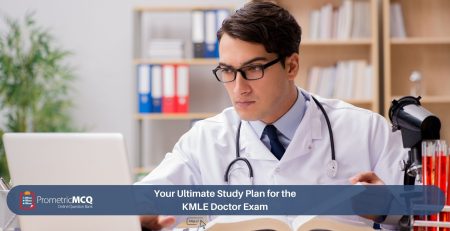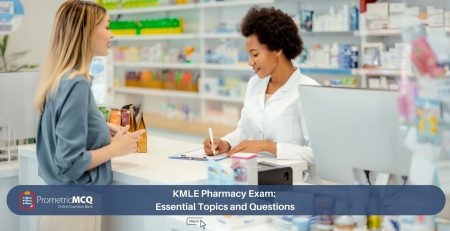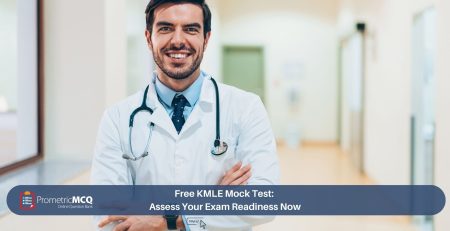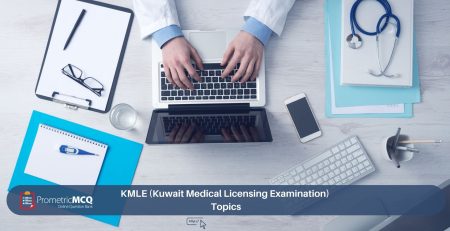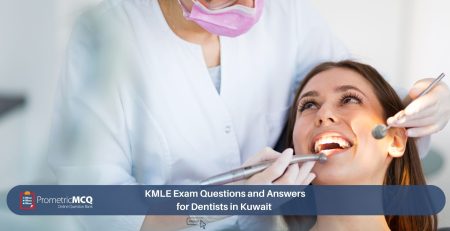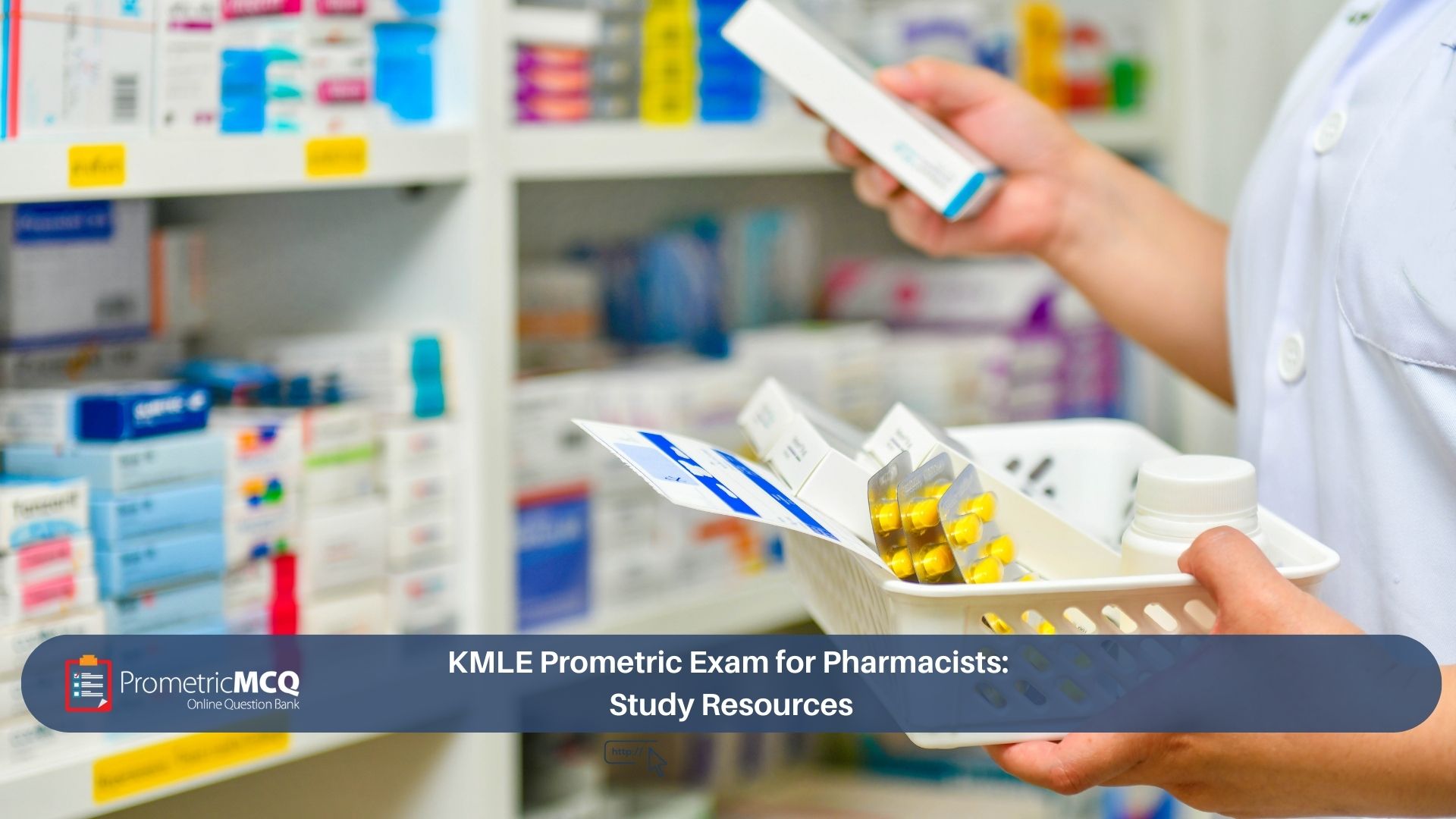
KMLE Prometric Exam for Pharmacists: Study Resources
fatima@prometricmcq.com2025-09-19T21:38:19+00:00Table of Contents
ToggleKMLE Prometric Exam for Pharmacists: Study Resources (2025)
For pharmacists worldwide, Kuwait represents a significant opportunity for professional growth within a modern and well-regulated healthcare system. The key to unlocking this career path is the Kuwait Medical Licensing Examination (KMLE) for Pharmacists. This comprehensive, high-stakes exam, administered by Prometric, is designed to ensure that all practitioners meet the stringent standards of clinical competence, patient safety, and pharmaceutical knowledge required by the Ministry of Health. Success on the KMLE is not merely about what you know; it’s about how well you can apply that knowledge in a timed, high-pressure, clinical context.
Navigating the vast sea of available study material can be overwhelming. An effective preparation strategy is not about consuming the most information, but about using the *right* information in the most efficient way. Choosing high-yield, exam-focused study resources is the single most important decision you will make in your preparation journey. It is the difference between aimless reading and targeted, strategic learning that directly translates to exam-day success.
This ultimate 2025 guide is meticulously designed to be your definitive catalog of the best study resources for the KMLE Pharmacy Exam. We will explore the gold-standard textbooks, the most effective online tools, and, most importantly, the critical role of Multiple-Choice Question (MCQ) banks. This article will provide a structured approach to resource utilization, complete with a detailed 10-point FAQ section to clarify every step of the process. Our goal is to eliminate the guesswork from your preparation, empowering you to build a study plan that is both comprehensive and laser-focused on passing.
Key Takeaways on KMLE Pharmacy Resources
- A Multi-Resource Approach is Best: Combine a core textbook, a high-quality QBank, and a reliable drug database for a well-rounded preparation.
- Question Banks are Non-Negotiable: Active learning through solving MCQs is the single most effective strategy for mastering the exam format and content.
- Focus on Clinical Application: Choose resources that are case-based and emphasize clinical reasoning over rote memorization of facts.
- Standard Textbooks are Your Foundation: Use globally recognized pharmacy textbooks to build a strong foundational knowledge in all core subjects.
- Don’t Neglect Calculations: Dedicate specific resources and practice time to mastering pharmaceutical calculations, as this is a guaranteed section of the exam.
Understanding the Exam You’re Preparing For: The KMLE Pattern
Before selecting your resources, you must understand the structure of the exam they need to prepare you for. A general overview can be found in our main KMLE exam guide, but for pharmacists, the key points are:
- Format: 150 Multiple-Choice Questions (MCQs) in a Computer-Based Test (CBT).
- Duration: 3 hours (180 minutes), averaging 1 minute and 12 seconds per question.
- Syllabus Focus: A heavy emphasis on clinical pharmacy and pharmacotherapy, pharmaceutical sciences (pharmacology, pharmaceutics), and flawless pharmaceutical calculations.
- Scoring: Pass/Fail outcome with no negative marking. The unofficial pass mark is around 60%.
Tier 1 Resources: The Foundational Textbooks
Your preparation must start with a solid foundation. These gold-standard textbooks are internationally recognized and cover the entire breadth of the KMLE syllabus. You don’t need to read them cover-to-cover, but use them as your primary reference to build and clarify concepts.
1. For Clinical Pharmacy & Pharmacotherapy
Pharmacotherapy: A Pathophysiologic Approach (DiPiro et al.): This is the bible of clinical pharmacy. Its disease-state-oriented approach is perfect for the KMLE’s case-based format. For each major disease (e.g., hypertension, diabetes, asthma), it covers pathophysiology, clinical presentation, and evidence-based therapeutic management. Focus on the chapters covering common conditions seen in primary care and hospital settings.
2. For Pharmacology
Goodman & Gilman’s The Pharmacological Basis of Therapeutics: For a deep understanding of *how* drugs work, this is the definitive text. Use it to clarify mechanisms of action, pharmacokinetics, and adverse drug reactions for major drug classes. It is an excellent resource for answering the “why” behind drug therapy.
3. For Pharmaceutics & Calculations
Ansel’s Pharmaceutical Dosage Forms and Drug Delivery Systems: This book covers the principles of drug formulation, biopharmaceutics, and delivery systems. It’s essential for understanding the science behind the products you dispense. For calculations, a dedicated book like Pharmaceutical Calculations by Howard C. Ansel is invaluable for practicing everything from basic dilutions to complex infusion rate problems.
The Most Critical Resource: High-Quality MCQ Question Banks
If textbooks are the foundation, then question banks (QBanks) are the structure you build upon it. Passive reading leads to poor knowledge retention. Active recall, problem-solving, and self-assessment through MCQs are what truly prepare you for the exam.
A good QBank does not just test your knowledge; it teaches you how to apply it. The detailed rationales provided for each answer option are often more valuable than the questions themselves.
Why QBanks Are Essential:
- Simulate the Real Exam: They expose you to the format, style, and timing of the actual KMLE.
- Identify High-Yield Topics: The distribution of questions in a well-designed QBank naturally reflects the weighting of topics on the real exam.
- Develop Clinical Reasoning: Case-based questions train you to dissect patient scenarios, identify pertinent information, and make sound clinical judgments.
- Pinpoint Your Weaknesses: Performance analytics show you exactly which subjects or systems you are struggling with, allowing you to focus your study time effectively.
Investing in a comprehensive, up-to-date question bank tailored for Gulf-region pharmacy exams is the single most important step in your preparation. A robust platform with a large volume of questions is your primary tool for active learning. This is where resources like the PrometricMCQ Pharmacy MCQs collection become indispensable.
Tier 2 Resources: Digital Tools and Supplementary Materials
To complement your core resources, leverage the power of digital tools and stay current with the latest clinical evidence.
1. Online Drug Information Databases
During your practice, you’ll need quick access to authoritative drug information. Subscriptions to services like Lexicomp or Micromedex are invaluable. For a high-quality, free resource, the Drugs.com website provides comprehensive, peer-reviewed information on dosing, interactions, and adverse effects. This serves as an excellent external backlink and a vital professional tool.
2. Clinical Practice Guidelines
The KMLE is an evidence-based exam. You are expected to know the latest treatment guidelines for common chronic diseases. Make it a habit to review the executive summaries of guidelines from major international bodies:
- American Diabetes Association (ADA): For Standards of Care in Diabetes.
- American College of Cardiology/American Heart Association (ACC/AHA): For Hypertension and Cholesterol guidelines.
- Global Initiative for Asthma (GINA): For Asthma management.
- Global Initiative for Chronic Obstructive Lung Disease (GOLD): For COPD management.
Frequently Asked Questions (FAQs) on KMLE Pharmacy Resources
You don’t necessarily need to buy all of them, especially if you have access to a digital library through a university or professional organization. The key is to have at least one primary reference for pharmacotherapy (like DiPiro) that you use consistently. However, investing in a comprehensive QBank is non-negotiable.
While some websites may offer a small number of free sample questions, comprehensive, high-quality QBanks with thousands of questions and detailed rationales are typically subscription-based. Free resources are often outdated or not representative of the real exam’s difficulty. Your preparation is an investment in your career, and a quality QBank offers the best return.
A good target is to complete at least 2,000 to 2,500 unique MCQ questions during your preparation. The goal is not just to see a lot of questions, but to thoroughly understand the rationale for each one. Quality over pure quantity is key, but a high volume is necessary for broad exposure.
Unlike some other Gulf exams (like the NHRA in Bahrain or DHA in Dubai), the KMLE for pharmacists is primarily focused on international clinical standards. While a basic awareness of professional ethics is useful, you do not need to study specific Kuwaiti laws and regulations. Focus your time on the clinical and pharmaceutical science content.
The best resource is a dedicated calculations practice book combined with the calculations section of your chosen QBank. The key is repetition. You should practice calculation problems every single day until they become second nature. Accuracy must be 100%.
For textbooks, ensure you are using one of the latest editions (e.g., published within the last 3-4 years). For QBanks and online resources, check that their content is reviewed and updated regularly to reflect the latest clinical guidelines. This is a key feature of premium preparation platforms.
The Primary Source Verification (PSV) by the DataFlow Group is a mandatory credential check. It is not part of the exam but a requirement for licensing. For this, you will need scanned copies of your original documents: pharmacy degree, transcripts, pharmacy license, and experience certificates. No study resources are needed, only official documentation.
A combination of both is ideal. In the beginning of your preparation, study system-by-system (e.g., Cardiology, Endocrinology) and do topic-specific question blocks. In the final 4-6 weeks, switch to random, mixed blocks of questions to simulate the exam experience and test your ability to switch between topics quickly.
Instead of memorizing long lists, it’s more effective to focus on the top 200 drugs prescribed. For each of these, you should know the generic name, drug class, primary mechanism of action, major indications, and 1-2 key side effects or counseling points. Resources for this can be found in many review books and online.
A comprehensive platform that offers a large question bank, simulated exams, and performance tracking is your best bet. These packages are designed to cover all the high-yield topics in a format that mirrors the real exam. You can explore a variety of such resources on the PrometricMCQ MCQs Packages page.
Conclusion: Building Your Arsenal for Success
Passing the KMLE Pharmacy Exam is a direct result of a well-planned and well-resourced study campaign. There is no single magic bullet, but a strategic combination of foundational textbooks, authoritative digital tools, and, most importantly, a high-quality, comprehensive MCQ question bank will pave the most direct path to success. By investing in the right resources and dedicating yourself to an active, question-based learning strategy, you can master the content, conquer the exam format, and embark on a successful and fulfilling pharmacy career in Kuwait.
Ready to Transform Your Knowledge into a Passing Score?
Our premium Pharmacy MCQ bank is your complete resource, featuring thousands of high-yield clinical cases, detailed rationales, and simulated exams designed to cover the entire KMLE syllabus and ensure your success.

